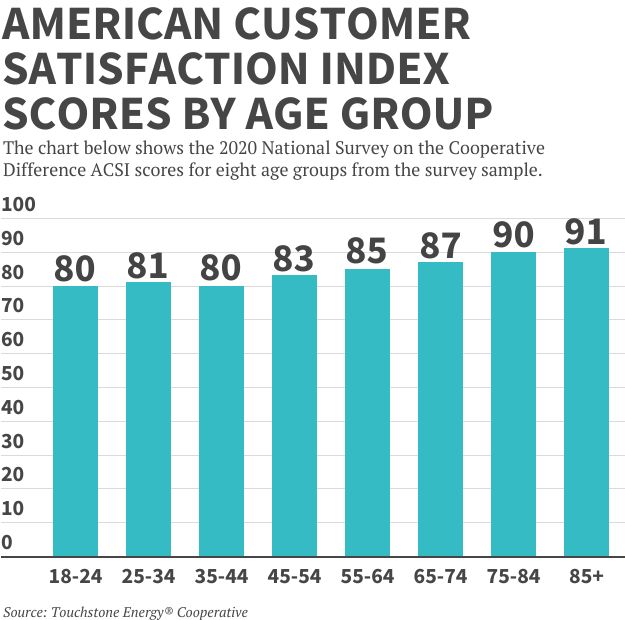Year after year, electric cooperatives score higher than their utility counterparts in Touchstone Energy® Cooperative’s Survey on the Cooperative Difference—and the 2020 results show that satisfaction and engagement scores are even higher among respondents expressing some degree of member or owner identity.
Co-ops participating in the recently released
National Survey on the Cooperative Difference averaged a score of 85, compared to 72 for investor-owned utilities and municipal utilities, in the American Customer Satisfaction Index, a cross-industry tool used by researchers.
But when survey respondents viewed themselves as members and not just customers, those scores were even higher, 90 versus 81.
“Moving consumers from a ‘customer’ focus to a ‘member’ or ‘owner’ identity pays immediate dividends through higher satisfaction and engagement scores,” according to the 2020 survey, which involved nearly 11,500 interviews with members of 47 co-ops in 17 states.
While higher levels of engagement and satisfaction generally correlate with older age groups, ACSI scores rose by four points over the 2019 survey for the 35-44 age group. That increase is likely related to the
Young Adult Member Engagement initiative, a collaboration between NRECA and Touchstone Energy, said Jana Adams, executive director of
Touchstone Energy.
“The collaboration between NRECA and Touchstone Energy has provided more information and more resources to effectively engage with this age group,” said Adams. “Last year, we saw new and continued outreach efforts, such as virtual annual meetings, that allow more opportunities to showcase the cooperative difference and reach new audiences.”
[section]
[section-item]
[row]
[column 12]

[/column]
[/row]
[/section-item]
[/section]
Member trust is another area where cooperatives outpaced the competition. When compared to smart technology powerhouses such as Amazon, Google and Nest, rural electric co-ops received significantly higher ratings.
For the first time, researchers asked members whether they rely on co-ops or the internet for information on smart devices and other emerging technology. Here, too, co-ops fared better than industry powerhouses. Co-ops received 8.4 out of 10, compared to 7.78 for Amazon, 7.40 for Google and 6.87 for Nest, which is owned and operated by Google.
“Touchstone Energy’s goal of positioning our co-ops as the trusted source for their membership is clear in this research,” said Adams. “With the uncertainty everyone experienced in 2020, members really got a sense of just how valuable their electric co-op is to their community.”
Here are five takeaways from the survey:
Co-ops actively measuring their performance provide superior service to members. The 47 co-ops taking part in the Touchstone Energy survey fared better than co-ops in ACSI’s utility sector report for 2020—85 and 73, respectively—and a point higher than investor-owned utilities and municipal utilities. “Co-ops continue to outperform the industry average as well as large, investor-owned utilities. They can be proud of this,” said Scott Saff, manager of research services at TSE Services, which conducts the survey.
Members are shifting their preference to digital communications. Increasingly, members are choosing to receive urgent and nonurgent communications by text or email. And as more members are moving to online billing to save money and reduce waste, co-ops should promote that option.
Highlight “member” identity whenever possible, especially with new members. “People won’t pick that up when they first join a co-op,” said Saff. “Co-ops should place some effort into highlighting the cooperative difference because members need to see examples of how the cooperative business model is different.”
Co-ops serve a technologically diverse but increasingly tech-savvy membership. A growing percentage of members are adopting smart home technologies. While younger members are more likely to embrace thermostats, speakers and other technologies, older members are also beginning to reap the benefits of smart solutions.
Educate members on the benefits of electric vehicles. EVs haven’t caught on quite yet in rural America, but there’s still “above average interest” among new members and households with higher incomes and children. Co-ops should consider offering test drives and consistent messaging “to create a well-informed membership eager to consider EVs as a legitimate option in the decade ahead.”
